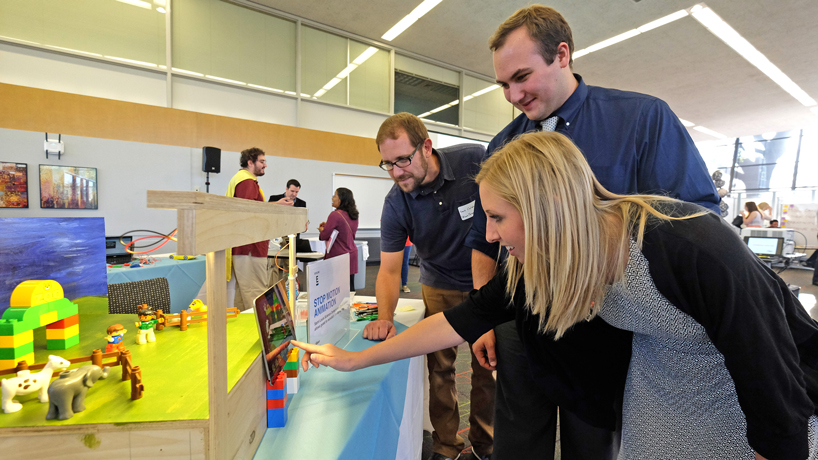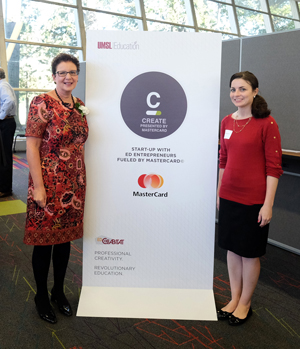
UMSL education seniors Jessica Reimer and Drew Muersch (right) watch a stop-motion animation while David Callahan, a representative of the St. Louis Science Center, looks on. (Photos by August Jennewein)
The University of Missouri–St. Louis ED Collabitat grand opening on Sept. 30 featured programmable robots, Tesla coils, custom-made stop-motion videos, local entrepreneurs and one preserved human brain. Participants explored how scientific and creative pedagogical strategies nurture collaboration among educators, innovators and community leaders.
The ED Collabitat is both a way of thinking and a space where students, faculty and community can come together to collaborate on projects, conceive programs to solve problems and renew education structures and cultures, said Ralph Córdova, executive creative director and lead researcher at the ED Collabitat.
Córdova believes the unions formed between teachers and community leaders will yield solutions to everyday academic and social challenges that elementary and post-secondary schools face such as attendance, literacy and transportation.
“We guide educators through a process called ‘Discovery Mapping,’” Córdova said. “The first phase is exploring the problem and recognizing different points of view. The second phase is envisioning radical solutions while deferring judgment. After ideas are sorted and classified, the educators move onto phase three where a prototype of the new curriculum design or technology is created and tested for failure or success. Instead of following one-size-fits-all advice from a book or program, educators are encouraged to find answers for their unique environment and situation.”
College of Education Assistant Dean Kathleen Fink asserts that the ED Collabitat’s partnerships with major businesses, successful entrepreneurs and start-up companies will revolutionize curricula across the nation.
“Many entrepreneurs, creative thinkers and problem solvers have ideas for education, but as non-educators, they often need a clearer understanding of how students learn,” Fink said. “A faculty member or graduate student can discern if an inventor’s ideas align with what we know about how kids learn. So a great product like Bloxels, that teaches kids programming through intuitive video game design, could be more finely tuned and become an even better educational tool.”

College of Education Dean Carole Basile (left) and Maureen Hergenroether, leader of Corporate Philanthropy at MasterCard, present the ED Collabitat’s Create strand.
So far, the ED Collabitat has attracted the attention of corporations such as MasterCard, whose generosity has made the the ED Collabitat’s Edpreneurs in Residence program possible. Program participants will present innovative ideas aimed at refreshing educational settings. Representatives of UMSL and MasterCard will serve as mentors. If accepted, the idea will undergo product testing, and the candidate will receive $1,500-$2,000 in seed money.
As described by Córdova, the Edpreneur program presented by MasterCard is part of the ED Collabitat’s “Create” strand. ED Collabitat is also composed of the “Explore” and “Design and Build” strands, which will host a variety of programs.
“ED Collabitat is such an exciting concept,” said Maureen Hergenroether leader of Corporate Philanthropy and Citizenship at MasterCard. “MasterCard is proud to team up with UMSL to help teachers make education more innovative, ignite creativity and encourage collaboration among students. With MasterCard’s commitment to innovation and inclusiveness, ED Collabitat was a natural fit and our employees are really looking forward to working closely with the programs.”
UMSL education senior Drew Muersch and education alumna Alex Callahan expect to make great use of the new initiatives.
“I think it’s cool that the deans and professors are teaching us how to collaborate and work together,” Muersch said. “It’s nice that we’ll have this space to practice before moving on to our real jobs.”
Having recently graduated from UMSL, Callahan fully understands the need for cooperation in school systems.
“The ideas people are bringing to the table here will help educators improve their practice, which is what it’s all about. We often consider what the kids need or where they could improve without thinking about the teachers, too,” Callahan said.
Dean of the College of Education Carole Basile believes the ED Collabitat will change local and national schools for the better.
“The ED Collabitat engages those outside of education as thought partners in helping to solve education issues from differing disciplinary lenses. Nationally, there is nothing like it and we hope that the EC can be a prototype to push on new thinking about what change in education can look like,” Basile said.















